Status Update: November 2022
LOTR Vol. II
It took me time, but I finished J.R.R. Tolkien's The Lord of the Rings, Vol. II - The Two Towers. The first one looked quite similar to the movies, while this second instalment departs at times quite noticeably from the movies and books (at least what I remember of them). I directly went to use a guide, and while I enjoyed the back and forth between the multiple storylines and you can feel that the game engine now was known and better used (more battles, bigger maps), it felt weaker than the first title.
Elden Ring
Unpopular opinion: I abandoned the game. I feel the lore and plot is just a spaghetti of miscellaneous concepts with a thin thread keeping most of them together, and the game demands too much of my time only to enjoy. I love pouring hours in games I have fun with (nearing 200h in Zelda BOTW, hundreds at each Diablo game, etcetera), but I don't enjoy being punished and sometimes cheap-killed frequently. So after 30h of gameplay, just shelved it. Not for me.
Baldur's Gate: Dark Alliance
After having finished it a few times in Playstation 2 and once in the Nintendo Switch, now I have it on PC and also have finished it once 😆
Castles & Castles II
I've loved medieval history since I was a child, so the early nineties franchise Castles offering me a chance to build and maintain castles "the way I liked" was so appealing. I went and played one campaign of each, and re-watched all the Castles II documentary videos, although the video compression is quite ugly nowadays.
Assassin's Creed: Valhalla
I love how Ubi Soft try to respect history, while twisting details to simplify gameplay. In AC Valhalla you will notice it more frequently because the vikings were all but peaceful folks, so you can do viking raids but they are a decaffeinated version (mostly focused on combat and looting). Still they are a nice addition, and the boat travels, fights and all-things-related feel amazing.
What got me tired of the game is the usual Ubi Soft mechanics: You have so many primary quests, secondary quests, optional quests, side-quests, fetch quests, treasure quests and who-knows-what-else quests, that you burnout easily, because in the end gameplay mechanics are what they are: An assassin jumping, sneaking and killing people. So after around 40h, the game tells me I have finished barely around 30%, so I need to to take a break before I abandon it permanently.
It is really amazing visually, and fun to play, it simply gets tiring and should be smaller in missions scope.
Xenoblade Chronicles 3
The third instalment came out on Nintendo Switch, so I'm slowly warming up to pour in the dozens of hours that each new title in the saga takes. The beginning is a bit slow, but it is too early and fans of the series praise the plot so let's see what awaits!
Valheim
More Nordic mythology reading, plus stopping playing AC: Valhalla made me crave for some other "viking themed game". I visited a videogame museum that mentioned the early access title Valheim, and I already had my sights on it, so decided to purchase it and play. It is a survival crafting game (but with a purpose and I think a real ending if you pursue the plot), so I'm still struggling to survive in my small fenced house, while I improve my skills and learn how to craft better tools and equipment to face my first enemy boss, but the game is really fun: you need to build the houses following the old nordic ways, having a fire inside to keep you warm but at the same time letting the smoke go out (or you will choke), structures have weight and pressure, and the pixelated textures 3D engine is actually quite pleasing visually.
Boardgames
On the boardgames side, me and my partner began playing some not too complex boardgames from time to time, so I decided to purchase a very simple dungeon crawler, Karak. We've played a few games and, while it indeed has simple mechanics, is really easy to get into and fun for everyone.
Tags: Videogames
Comic Book Review: Aliens Omnibus 1 to 6



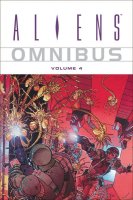


I've always loved Aliens. They made me had nightmares when I watched the movies as a child, but I loved them. I would build LEGO bases and vehicles and imagine my characters had to survive xenomorph attacks. I had some metal painted miniatures, and played every Arcade and that licensed or was inspired by the movies. And I had since long pending to read the six Aliens Omnibus volumes.
Vol. 1 is a bit long and sometimes bizarre, with too much effort put on keeping present the original (surviving) characters from Aliens movie. But a few of the shorter series had a pass, so not terrible.
Half of Vol. 2 is Colonial Marines, a huge mashup of loosely connected sub-stories, under a common setting and plot. At times I felt there were missing pages due to the sudden narrative changes, jumping to an unknown character that we briefly see during two pages to never be heard of again afterwards. I also probably didn't liked it too much because it breaks the "xenomorph science" rules, stretches and the royal jelly concept too far for my liking.
And then everything gets even worse: Too many comics along the whole Omnibus series have too weird, surreal and sometimes even directly disgusting plots. Once they came up with the "royal jelly as drug" concept, all sorts of twists around the concept are used over and over, as the basis for otherwise weak stories. Also to be noted that the usage of iconic guns, spaceships and APC tanks in some cases is nice, but in general is over-abused, up to the point that Earth has been almost destroyed and re-created (way after the first two Alien movies), humanity seems to have advanced, and yet they keep using almost the same ships, vehicles and weapons.
To be sincere, when I was at the sixth and last omnibus, I skipped more than half of it. skimming through the pages or checking the first ones of each story were enough to detect that quality didn't improved, so I decided to not waste my time.
I feel deeply disappointed. Predator Omnibus felt dull and repetitive at times, but Aliens Omnibus is directly bad, excepting a few very specific mini-series.
Tags: Comics
Pirate Ghost Ship model kit
I am slowly coming back to miniature painting, and I thought that buying a simple but model kit could be a nice start. After going to a naval museum I thought about maybe some ship, and decided to buy the Revell Ghost ship model kit. It is far easier to assemble than any normal boat (with the sails and cords/ropes) and the "glows in the dark" feature peeked my curiosity.
The model is advertised as "easy-click system", and while most of it can indeed be built without glueing the pieces, as they just snap in, there's a few ones where I think it would very easily go off, like the union points between the (plastic) ropes and the masts. So I just glued everything.
It comes with a glow in the dark paint can, and in theory you don't need anything else, but I decided to basecoat the whole ship with black, and bronze for the brown plastic parts. The special paint is curious, feels like a mix of glowing pigment and glue. You'll have to apply multiple layers, and the ship eventually gets the greenish color, but must also be careful as a too big and non spread chunk of paint will stay when dried. Also the stickers are not water-based, but simple plastic children-like ones, which is sad as I couldn't properly hide them despite applying a few layers of glowing paint over. I should have cut them with scissors to leave just the real skull and crossbones part, but didn't thought about it.
Overall, I really like how the finished model looks. It was a fun assembly, a simple but long painting process, and it really glows nicely in the dark "after charging" with sunlight.
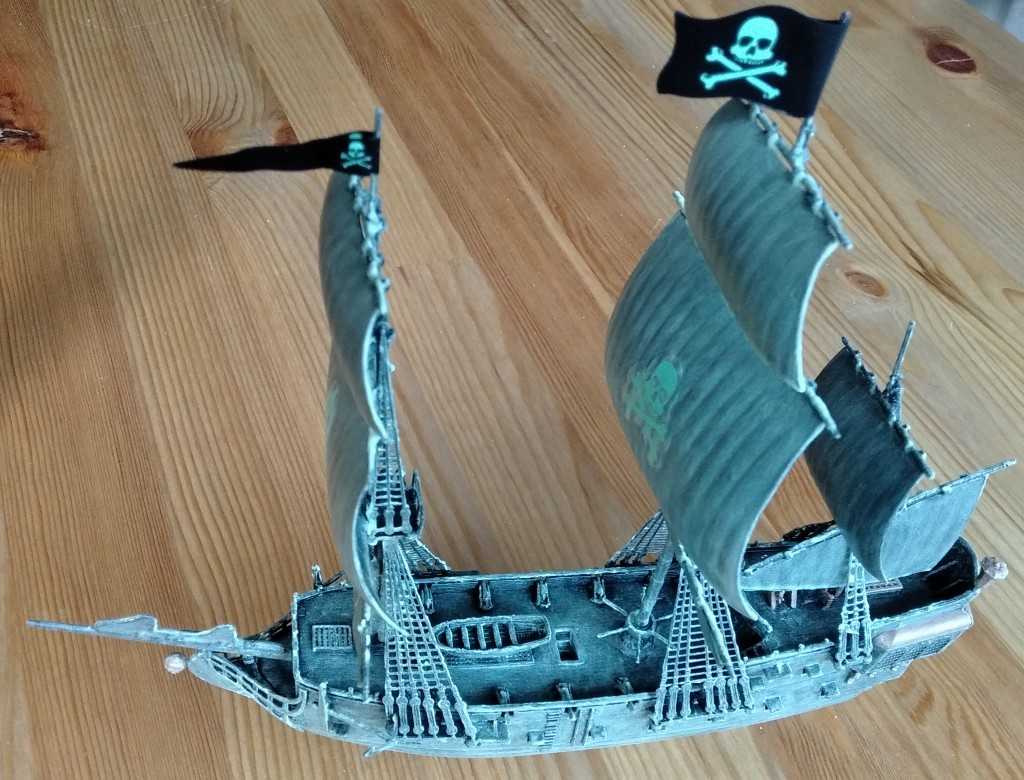
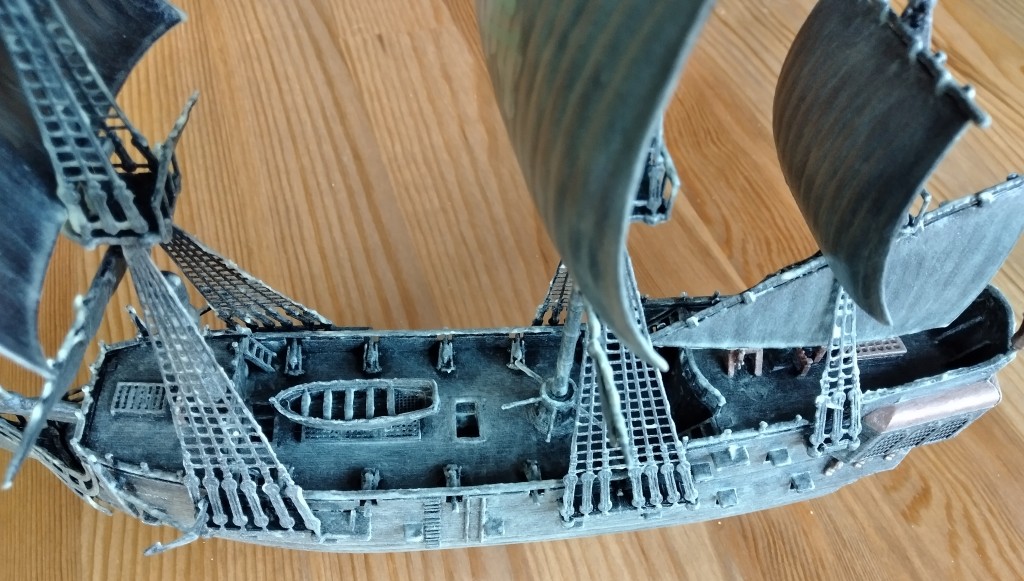
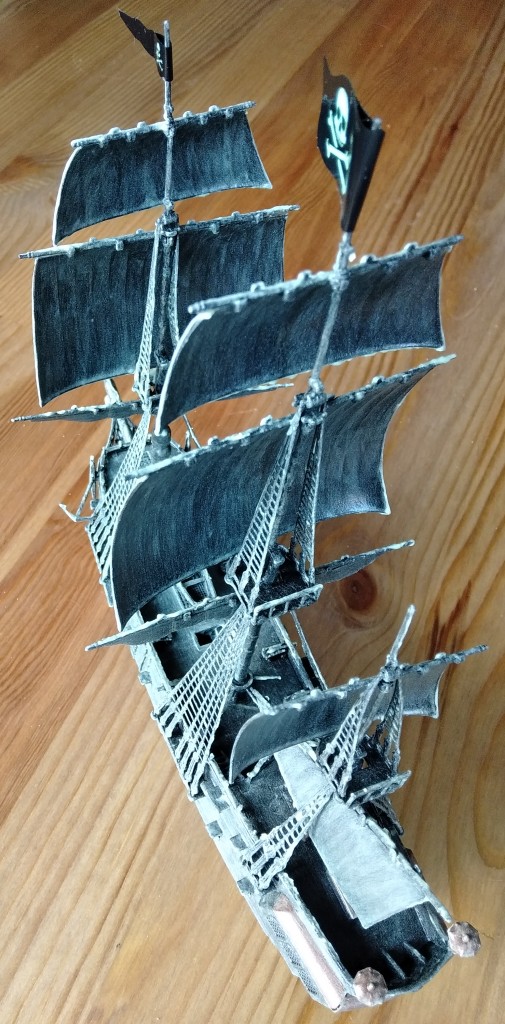
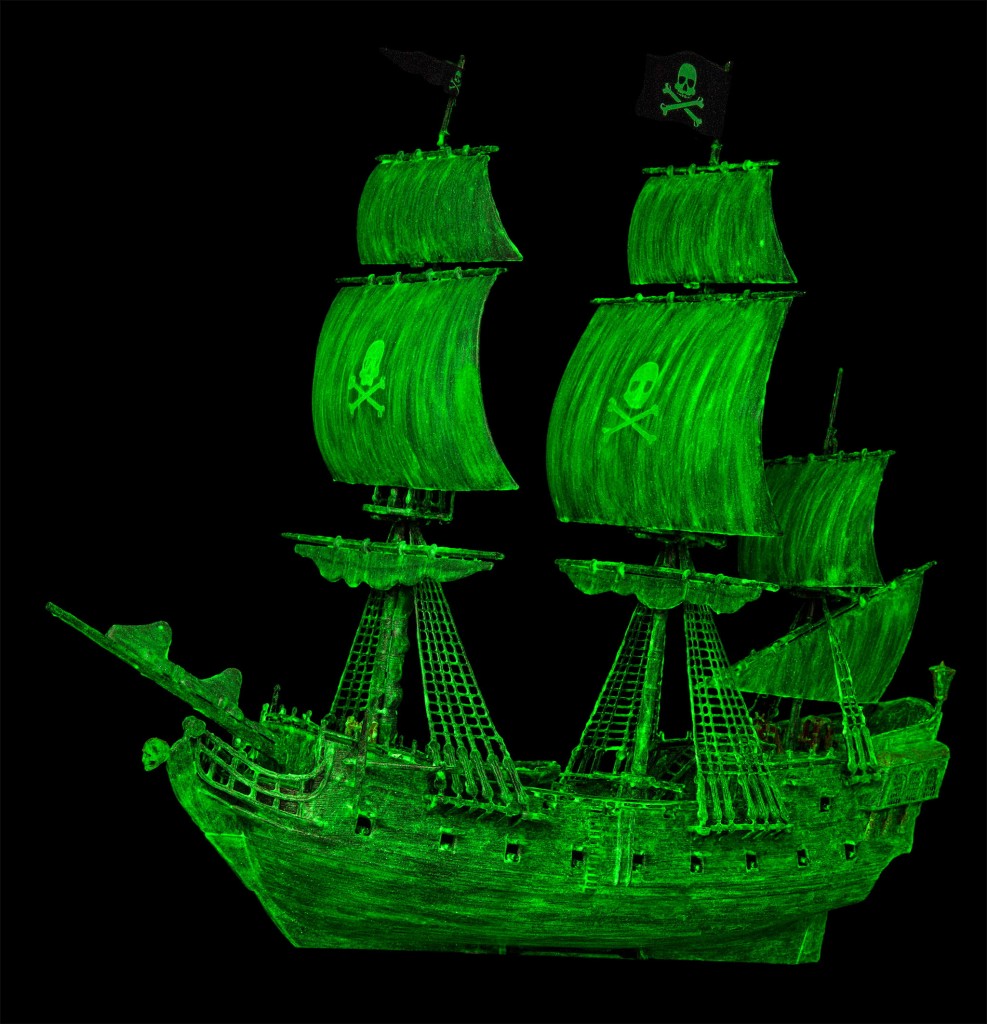
Glowing photo taken from the official Revell site as my camera is crappy and can't take good photos in the dark. While not as incredibly green, it does glow a lot and looks very cool.
Tags: Painting
Book review: The Art of The Lord of the Rings
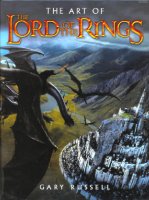
I had since quite a while pending to read The Art of The Lord of The Rings, and I had ignored it so much that I didn't even knew that it was based on the movies trilogy. Having art pieces from Alan Lee and John Howe, I thought it would be based on the classic drawings that I remember from my childhood... But no, although it features artwork and text from those known artists, among others, it is all tied to the movies. This is not bad on itself, just that I had to adjust my expectations. I guess I'll have to get my hands on the other art book with the same name someday!
Much of the content, which consists on around 500 illustrations, sketches and drawings, was the initial inspiration or initial iterations before the filming of the movies, so I really like how many of the illustrations predate the final look, by showing different approaches to characters, scenarios, and sometimes even simply colors and themes. We get to see different versions of Gollum, more armoured orcs and elfs, iterations on different iconic buildings... Always with very high quality and beautiful imagery.
After the initial "shock", it was a pleasant surprise to find all new content based on some of my favourite movies. It even made me now prioritize reading the books again - has been really long since I last did - in order to proper see the differences between both mediums.
Tags: Books
Status Update: Final Fantasy VII Remake, LOTR and Elden Ring
LOTR Vol. I
I played and finished J.R.R. Tolkien's The Lord of the Rings, Vol. I. I must confess I had to use a guide, because the game a) has an archaic UI with commands and text inputs and b) contains quite a few bugs and game-over triggers (some of them not immediate), so I went the "safe enjoyment" route.
It's been so long since I read the books, and I've watched so many times the movies, that I feel I must read the original materials again to see if the game departs a bit in certain areas, or if it is correct and were Peter Jackson's movies the ones reordering certain events. But in general it felt an interesting adventure, with lots of text (thankfully!) and attempts to provide multiple choices and some kind of open-world mechanics, although sometimes it also meant that you do things wrong and don't know until later that you've effectively screwed up the game and should start over. In any case, I will soon play Vol. II, The Two Towers and see how much did it improved (if anything).
Final Fantasy VII Remake
I recently finished Final Fantasy VII Remake, and my general feeling is of sadness. The graphics are amazing, the music is amazing, the new combat system is action-packed and probably the best in the series, the bosses look incredible, some fragments of the game are really good... But despite really trying to, I couldn't get to love this "remake". It contains so much filler content, so many dull conversations, boring and repetitive secondary quests and all kinds of tricks to increase the length of a playthrough, that I really wish they instead just rebuilt the engine and left everything like in the original FFVII but with new Graphics and sound (and if anything, the new battles). There are also story changes, some of them extensions (way more secondary characters lore and interactions and conversations), some of them not bad (Shinra is more evil, or the whispers of fate are two good examples), but some... make me be aware of the next title.
I put the nostalgia glasses on (as a friend of me says), but precisely because of that I enjoyed it even less, because I had began playing the original last year and stopped at the precise same moment this title ends, and comparisons are bad, but sometimes inevitable. Or maybe I've also grown and are no longer a hyped teenager experiencing his first Final Fantasy title on a quite decent PC port (2x the PSX resolution and enhanced 3D effects!). I'm not sure exactly what the combination is, but what I really think is that this title is an attempt to move the fans into a new game, instead of representing a tribute to the old one. We'll see with the second title.
Elden Ring
I tried to avoid the hype, but it caught me. I am not a fan of the Dark Souls games mostly because I don't have enough spare time to endure the slow training the games require, so I cannot say that my time so far with Elden Ring has been amazing. But it hasn't been bad either, I clearly see that it is a really good game, just quite punishing and forcing you to learn the hard way (by dying a lot). I get the feeling that the story is half open to your imagination half "We didn't care much about it" (no matter who they say collaborated in the lore and/or script), and similarly it is an open world "without borders" but also sometimes feeling chaotic or at least far from being as polished as Zelda: Breath of the Wild's world.
I am around 30 hours in, still exploring mostly on my own, but I began taking small hints from a guide (for now just a map marking a recommended order of exploring the various game areas), because sometimes frustrates to be exploring for hours and then you realize you are in a high level zone and simply trying to escape you die, and then have to decide between spending +1h on recovering the gold runes versus doing anything else (in the game or in real life). I appreciate the openness but it is often too much for my taste, I would have loved some extra guidance, again as Zelda or a GTA or an Assassin's Creed do.
I will finish the game but I am surely not going to go hunt all the secrets, of which there seem to be many. I'll focus my knight on levelling enough to kill the bosses and do all main quests, while exploring from time to time but keeping in check the limits. Time is lately my most valuable and scarce asset.
Tags: Videogames